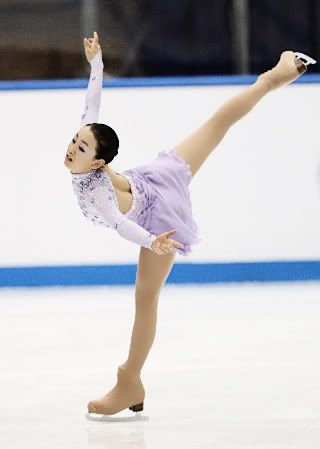Asada's struggles show perils of coaching switch
- by P J Kwong, CBC.ca Sports
It's at this time of year, as the figure skating season gets underway in earnest, that all of the changes that have taken place over the summer come to light.
The most significant of those changes for a skater is the decision to switch coaches.
At the recently concluded Grand Prix event in Japan, the 2010 Olympic women's silver medallist and reigning world champion, Mao Asada, took the ice to compete. In both her short and free programs, she was a disaster, failing to execute the majority of her jumps and finishing in an unheard-of eighth place. The issue, seemingly, is a total re-vamp of her jump technique by her recently hired coach, the legendary Nobuo Sato.
From the outside, it seems strange that a skater would consider changing coaches, especially when they seem to be steeped in success. The coach-student relationship is like any other and can be fraught with issues.
"It's like getting the chance to go to a party where no one knows you and there are no preconceived notions," says four-time world champion Kurt Browning. "Coaching has all of the trappings of any other relationship and sometimes all you need as a skater is to start again. There's no history there and you can start over.
Olympic bronze medallist Tracy Wilson concurs. "In changing coaches, skaters get the chance to re-invent themselves."
It's common knowledge that when a coach starts working with a new student, they will more often than not make changes to a skater's technique in an effort to help them develop. But how much room for development can there be with a world champion?
The Olympic factor
Not winning the Olympic title may have been the catalyst for Asada, although that's speculation. As spectators, all we saw was a skater hoping to capitalize on one jump, the triple Axel, and compromising on the lyrically fluid skating style and choreography that took her to the top in the first place.
For this season, Sato has taken all of the jumps back down to the beginning and will have Mao include all of the triples in her free program this season. Choreographer Lori Nichol was charged with the task of creating a complex and beautiful free program for her former student. For the skater, it must be a lot to take in.
The problem as I see it is, in the case of an elite athlete like Asada, you have to wonder if the public failure in an event like the NHK Trophy is enough to rattle her self confidence permanently.
"The risk always is if a skater isn't committed for the long haul and can't take the suffering," Wilson says. "The changes can take anywhere up to a season for a skater to feel comfortable. I worry about Mao because she announced her change in September, which is very late. Most skaters will make a change much earlier in the off-season."
It's early yet, and Wilson says that in some ways, if a skater is going to make a coaching change, this is the optimal time.
"It's a great time to do this because the Olympics in Sochi in 2014 are far enough away that what happens this season won't really affect anything."
The key is to have faith and to stay the course. Time will tell.
